
The Pontifical Catholic University of Campinas is a private and non-profit Catholic university, located in Campinas, the second largest city in the State of São Paulo. The university is maintained by the Catholic Archdiocese of Campinas.

The Federal University of Minas Gerais is a federal research university located in the state of Minas Gerais. Its main and biggest campus is located in the city of Belo Horizonte, Brazil. It is one of Brazil's five largest and highest-ranked universities. It offers 79 undergraduate education programs, upon completion of their curricular schedule the student is awarded either a bachelor's degree, a licenciate degree, or a professional higher-education title, all officialized by the issue of a university diploma. It also has 90 postgraduate education programs, awarding 30 postbaccalaureate specialization degrees, 92 master's degrees, and 72 doctoral degrees, as well as 41 medical residency programs offered at UFMG's hospital facilities complexes. The university also has campi at Tiradentes and Montes Claros. Most courses, however, are taught at the main campus, located in the Pampulha district of Belo Horizonte.
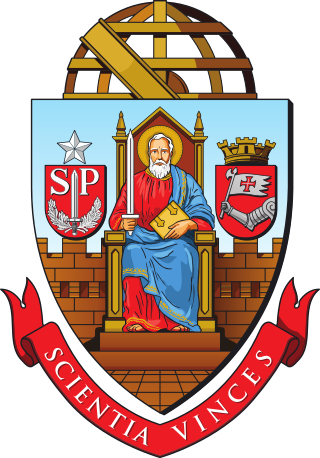
The University of São Paulo is a public research university in the Brazilian state of São Paulo, and the largest public university in Brazil. Since its founding, the university has maintained its status as the country's most prestigious educational institution.
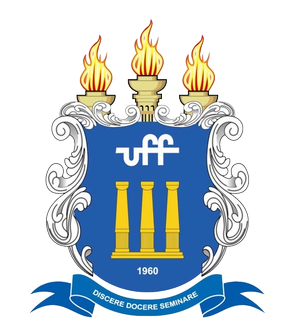
The Fluminense Federal University is a Brazilian public higher education institution located mainly in Niterói and in other cities of Rio de Janeiro state. It was first established on December 18, 1960, with the name of Universidade Federal do Estado do Rio de Janeiro (UFERJ), through an integration of different academic colleges in the city of Niterói. On November 5, 1965, the current name became official.
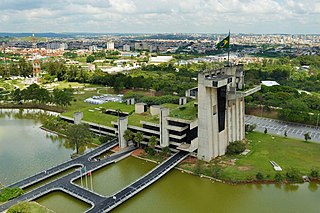
Sorocaba is a municipality in the interior of the state of São Paulo, Brazil. With over 723,000 inhabitants, it is the seventh-largest city in the state and the second-largest outside the Greater São Paulo region, ranking behind only Campinas. It forms its own Metropolitan Region of Sorocaba, comprising 27 municipalities with a total population of 2 million inhabitants, the 15th most populous in Brazil.

Londrina is a city located in the north of the state of Paraná, South Region, Brazil, and is 369 km away from the state capital, Curitiba. It is the second largest city in the state and fourth largest in the southern region of the country, with 555,965 inhabitants in the city proper (2022).

Science and technology in Brazil has entered the international arena in recent decades. The central agency for science and technology in Brazil is the Ministry of Science and Technology, which includes the CNPq and Finep. This ministry also has a direct supervision over the National Institute for Space Research, the National Institute of Amazonian Research, and the National Institute of Technology (Brazil). The ministry is also responsible for the Secretariat for Computer and Automation Policy, which is the successor of the SEI. The Ministry of Science and Technology, which the Sarney government created in March 1985, was headed initially by a person associated with the nationalist ideologies of the past. Although the new minister was able to raise the budget for the science and technology sector, he remained isolated within the government and had no influence on policy making for the economy.

The Federal University of Mato Grosso is a public university in the state of Mato Grosso, Brazil. Responsible for serving the entire state, its main campus is in the capital city of Cuiabá. Smaller campuses are located in Barra do Garças, Pontal do Araguaia, Sinop, and Várzea Grande, while the former campus at Rondonópolis is now the Federal University of Rondonópolis, split off in 2018.

São Paulo State University is a public university run by the state government of São Paulo, Brazil.

The Pontifical Catholic University of São Paulo, locally known as PUC or the Catholic University, is a private and non-profit Catholic university. It is maintained by the Catholic Archdiocese of São Paulo. The university is also responsible for the St. Lucinda Hospital (Sorocaba) and the TUCA theatre
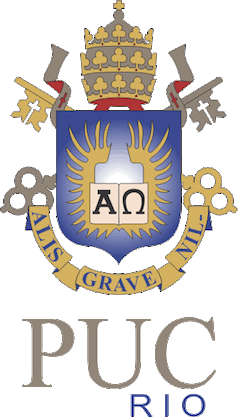
The Pontifical Catholic University of Rio de Janeiro is a Jesuit, Catholic, pontifical university in Rio de Janeiro, Brazil. It is the joint responsibility of the Catholic Archdiocese of São Sebastião do Rio de Janeiro and the Society of Jesus.

The Pontifical Catholic University of Rio Grande do Sul is a private non-profit Catholic university. With campuses in the Brazilian cities of Porto Alegre and Viamão, it is the largest private university of the state of Rio Grande do Sul and the first university founded by the Catholic religious institute of the Marist Brothers. PUCRS is considered the best private university of Brazil's Southern Region by the Ministry of Education (MEC), and one of the best private universities in the country, with FGV, PUC-Rio and the PUC-SP.
The University of São Tomé and Príncipe, USTP, is a public institution of higher education in São Tomé and Príncipe. It is the main institution dedicated to teaching, research and university extension of the country. It was established in 2014 by merging three older institutions of higher education: ISP, EFOPE and ICS.
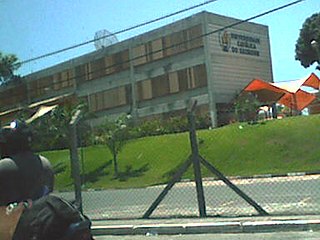
The Catholic University of Salvador is a private and non-profit Catholic university, located in Salvador, the first capital of Brazil, and fourth largest city of Brazil. It is maintained by the Catholic Archdiocese of Salvador.
The Federal University of Sergipe is a Brazilian public institution based in Sergipe, with campuses in São Cristóvão, Aracaju, Itabaiana, Laranjeiras, and Lagarto. Founded in 1967 by the junction of the state's existing colleges, it became its second university and its first public one. It became the state's most reputable and competitive higher education institution, ranking among the country's 40 best universities and Latin America's top 200 list.

The Catholic University of Portugal, also referred to as Católica or UCP for short, is a concordat university headquartered in Lisbon and with four locations: Lisbon, Braga, Porto and Viseu. Besides the four centres in Portugal, UCP also has the University of Saint Joseph in Macau as its affiliate.

The Federal University of São João del-Rei is a Brazilian university in the city of São João del-Rei in the state of Minas Gerais. It has other campuses in the cities of Ouro Branco, Divinópolis and Sete Lagoas, all of them in the state of Minas Gerais.

Centro Universitário da FEI is a higher education facility in São Bernardo do Campo, Brazil, offering undergraduate degrees in engineering, business administration, and computer sciences as well as master's degrees in mechanical engineering, electrical engineering, and administration; specialization courses are also offered. It is often ranked among the best Brazilian private engineering colleges and best overall in mechanical engineering, electrical engineering, and computer science.
















